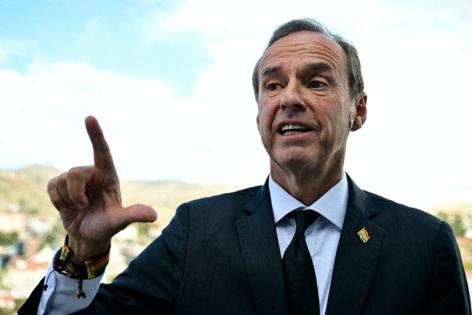A post-Socialist Bolivia will face major economic test after runoff vote
Published in Political News
LA PAZ, Bolivia — Bolivia’s presidential election Sunday will bring an end to two decades of rule by a socialist government that ran the economy into the ground. But the giddiness of voters and investors over the prospects of change will soon give way to the reality of a difficult turnaround.
The Andean nation’s sovereign bonds have returned almost 40% this year, among the top emerging-market performers globally, on anticipation of market-friendly shifts no matter who wins the runoff between centrist Senator Rodrigo Paz and conservative former President Jorge Tuto Quiroga.
Bond spreads have narrowed nearly eight percentage points, according to data from JP Morgan Chase & Co.
The optics have been undeniably positive for markets since August, when the nominee from the socialist MAS party of outgoing President Luis Arce and leftist stalwart Evo Morales finished a distant sixth in the first-round vote. But the fundamentals of Bolivia’s beleaguered economy — spiraling inflation, a soaring budget deficit and a severe lack of dollars — tell a different story.
The winner “will inherit not just depleted accounts, but a society already strained by shortages and inflation,” Jonathan Fortun, senior economist at the Institute of International Finance, wrote in an Oct. 9 report. There’s “no clean recovery narrative” post-election, he argues, but instead a choice between fast-but-painful spending cuts or slower fiscal reforms.
Nearly 8 million Bolivians are eligible to participate in Sunday’s mandatory vote.
The U.S. is also closely watching, as both contenders pledge to strengthen ties with the world’s biggest economy. After reaffirming his support for Argentina’s beleaguered libertarian President Javier Milei earlier this week, President Donald Trump himself pointed to Bolivia as one of several South American countries led by leftists he’d like to seek shift camps.
Latin American presidential elections over the next several months, including in Chile and Colombia, could also see new center-right leaders take over.
Both candidates are expected to have to lift fuel subsidies and allow the local boliviano currency to weaken — unpopular measures that could trigger social unrest. Addressing mounting foreign debt obligations will mark another early test.
A eurobond due in 2028 has a $333 million payment next March, while the government faces more than $400 million in debt payments in each of the next two years and then another $677 million in 2028.
Bolivia is home to the world’s largest lithium reserves and for years a significant natural gas exporter.
The latest polling in the race shows Quiroga, who briefly served as president from 2001-2002, ahead by about 8 points. But Paz edged him out in August’s first-round vote on a pledge to implement “capitalism for everyone.”
‘The once-dominant MAS party split after Morales and Arce clashed bitterly over who should lead amid a deepening economic crisis.
Paz is seen appealing to some MAS voters, while he’s also helped by his running mate, Edman Lara — a popular former police captain known for exposing corruption.
Paz and Quiroga offer similar economic proposals on reining in public spending and phasing out fuel subsidies, though they offer different compensatory plans. Both also favor ending the fixed exchange rate, in place since 2011, and want to lure foreign investment to create jobs.
Paz backs the legalization of imported vehicles, and more generous social benefits. Quiroga, meanwhile, pitches a more orthodox conservative model seen drawing support from the middle-income voters who are especially suspicious of MAS.
Both candidates will need to address currency collapse, high inflation, and fuel and dollar shortages, according to Ricardo Hausmann, professor and director of Harvard University’s Growth Lab. Consumer prices have risen by more than 23% over the past year through September.
Economic growth must also be restored after a 2.4% contraction in the first half of this year, beyond the mounting debt load.
“Bolivia’s problem is not the debt itself, but its inability to finance fiscal spending,” Hausmann said.
If the next government seeks a new IMF loan, a debt reprofiling will likely be unavoidable as the international lender won’t want its resources used to pay down external debt held by private creditors, said Ricardo Penfold, managing director at Seaport Global. “An IMF program would likely entail a depreciation, and a 50% real depreciation would raise debt by 13 percentage points” of gross domestic product, he added.
Constitutional reforms would likely be needed to attract private capital to the key energy and mining sectors since a MAS-backed constitutional rewrite 16-years ago established strong state control over the extraction of natural resources and discouraged companies from investing.
While Paz and Quiroga have voiced support to change these policies, their parties in Congress would need to form broader alliances to muster the needed votes.
In the weeks leading up to Sunday’s vote, fuel shortages have worsened, with drivers waiting days in long lines to fill their tanks. Energy Minister Alejandro Gallardo recently acknowledged that diesel supplies are depleted due to a lack of dollars. Farmers as well as industrial sectors have also been hit.
“The task is enormous and must be done in parallel, not in phases. People must feel that the three immediate problems — inflation, access to dollars, and fuel — are being solved,” said Carlos Toranzo, a La Paz–based economist and political analyst.
Polls on Sunday open at 8 a.m. local time and close at 4 p.m., with preliminary results expected around 8 p.m.
©2025 Bloomberg L.P. Visit bloomberg.com. Distributed by Tribune Content Agency, LLC.
























































Comments